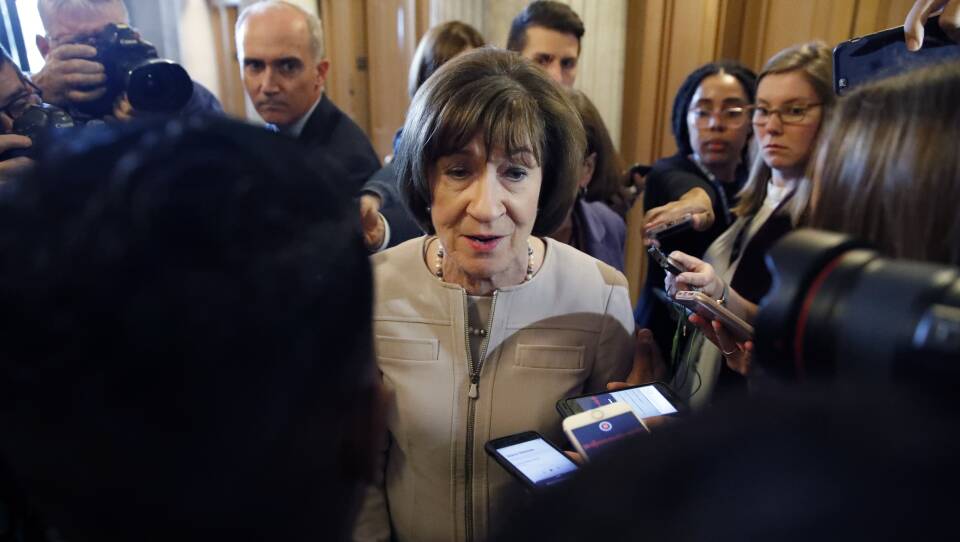A new television ad attacking Maine Senator Susan Collins, courtesy of anti-Trump Republicans collaborating as the Lincoln Project, scrolls through photographs of the state’s admired former holders of the position. Those familiar faces—most notably, Collins’s former colleague Olympia Snowe—are extolled as independent voices for the notoriously non-conformist Maine populace.
Collins, the ad decries, betrays their legacy by acting as Donald Trump’s enabler and apologist.
It’s a smart tack: Maine’s political self-conception is wrapped up in this notion of centrist independence. While the rest of the country blindly follows one party banner or ideology, Mainers and their elected leaders follow the path of principle and common sense. Or, so the story goes that they tell themselves.
There is a solid basis of truth behind the tale, to be sure. Maine’s other U.S. Senator, Angus King, is an independent (though apparently too Democrat-oriented for Lincoln Project to include in its ad), and the frequency of independent candidates affecting outcomes has prompted the state to become a leader in adopting ranked-choice voting.
And certainly, Collins herself is counting on that nonconformist streak to win a fifth six-year term in Washington. She has always been able to court votes from well beyond the Republican party—in 2014, taking 68 percent of the vote, including a whopping 120,000 who did not vote for fellow Republican Paul LePage in his re-election as Governor on the same ballot.
But the Maine mythos is not quite what it’s cracked up to be. Unlike Massachusetts, where unenrolled and third-party voters have grown from 51 percent to 57 percent of all registered voters, from 2008 to 2020, in Maine that figure dipped from 39 percent to 36 percent.
In fact, registered Democrats now outnumber the unenrolled in Maine, thanks partly to interest in this year’s Presidential primary battle.
It’s one of several signs that, at least for the moment, partisanship outweighs independence even in the Pine Tree State.
That’s a big reason why the Collins political phenomenon—which has made her the only Republican New Englander in either house of Congress today—might well be headed for defeat this November.
A New England Anomaly
Here’s how much of an outlier Collins is in New England: she is not only the last Republican in the region to win re-election to the Senate, in 2014; she was also the last to do it before that, when she won her third term in 2008.
Kelly Ayotte and John Sununu lost their first re-election attempts in New Hampshire, in 2016 and 2008 respectively. Scott Brown lost his in Massachusetts, in 2012. In Rhode Island, Lincoln Chafee lost to Democrat Sheldon Whitehouse in 2006, after barely surviving a primary challenge from the right.
Vermont’s last Republican Senator, Jim Jeffords, left the party to begin caucusing with Democrats in 2001. Connecticut hasn’t had sent a Republican Senator to Washington since voting out Lowell Weicker in 1988.
Every New England state has had Republican Governors in recent years—three of the six do now. In fact, Chafee, Weicker, and Sununu all won statewide elections after being booted by voters from the Senate, albeit not all still campaigning as Republicans.
The trouble, for those who represent the region in Washington, is that it’s one thing to campaign as an independent-minded Republican; it’s quite another to maintain that claim amid the antics of an increasingly cartoonish GOP Senate caucus—not to mention how that label is tarnished in the House of Representatives, conservative media, and now the White House.
Trump, of course, has intensified partisanship everywhere, and Maine is no exception. Compounding her problem, the balance of partisan power in the Senate likely depends on whether Collins wins re-election. Party politics is inseparable from the choice for or against Collins.
Democrats, meanwhile, have put up a relatively moderate candidate of their own: 48-year-old Speaker of the state house of representatives Sara Gideon, of Freeport. Gideon’s reputation as a safe, non-extreme Democrat was bolstered by opposition from two aggressively progressive candidates; she handily beat them in a COVID-delayed primary in mid-July.
That could make Gideon a tough target. Attacks on Gideon from Collins and Republican PACs have, so far, centered more on personal issues than ideological or partisan ones: campaign finance misconduct, and alleged failure to act on information about another state representative’s sexual misconduct.
The result: two July polls showing Gideon leading Collins by four to five percentage points.
Collins is running ahead of Trump, who trails in the state by as much as 12 points, but there just don’t seem to be enough ticket-splitters willing to vote against Trump but still give Collins the benefit of the doubt.
Losing Validators
Still, Collins has defied party drag before. For some years now, she has been alienated from what we would now call the Trumpist wing of her party—exemplified by LePage. As noted above, Collins was able to easily win on the same ticket that saw LePage scrape to a narrow re-election as Governor.
And, despite the hyperbole from Lincoln Project and others, Collins remains one of the least accommodating Republicans in Congress. She maintains a relatively centrist voting record, declines to support Trump’s re-election (as she claimed to not vote for him in 2016), and has stood virtually alone in her caucus in opposing several Trump nominees, including most recently Judy Shelton for the Federal Reserve board.
Like Gideon, Collins gets a boost to her moderate branding by virtue of criticism from her own party. LePage and those like him disdain Collins as a Republican In Name Only and worse. LePage reportedly considered running against Collins this year; Collins passed on a 2018 gubernatorial campaign in large part, it seemed, because she would have difficulty winning that Republican primary.
Yet the balancing act for Collins keeps getting trickier. Because her seat is seen as a potential tipping point between Republican and Democratic control of the Senate, Democrats have poured money into the campaign against Collins. So, Collins must rely on big bucks from national Republicans, particularly the National Republican Senatorial Committee—which means that she can’t afford to step on the toes of Senate Majority Leader Mitch McConnell and other GOP Senate leaders, who control those cash spigots. That, in turn, makes it harder for her to demonstrate the independent streak Mainers look for.
And, since those Senate Republicans are loath to stray an inch from Trump’s favor, Collins finds herself pressed into service to the President.
That all came to a head in the confirmation of Brett Kavanaugh’s appointment to the Supreme Court. Collins twisted every way she could, but ultimately voted yes.
That vote, and all it came to represent, goes a long way to explaining why Collins has lost one of her most valuable assets: outside validation from organizations and individuals usually associated with Democrats or liberal causes.
In her past Senate campaigns, Collins has received endorsements from Planned Parenthood, League of Conservation Voters, Everytown for Gun Safety, and Human Rights Campaign, who all saw her as a valuable ally on the Republican side of the aisle.
But this year, every one of them has endorsed Gideon, along with several labor unions who previously backed Collins.
That doesn’t seem to reflect a sharp rightward move by Collins, or even the relative strength of Gideon compared with 2014 Democratic nominee Shenna Bellows.
The defections seem mostly to stem from a greater urgency to excise all vestiges of the current, Trump-led Republican Party. Regardless of her intentions, these advocacy groups seem to be saying, ultimately a vote for Collins is a vote to keep McConnell in charge of the Senate, which holds inevitable consequences for their issues.
So far, Collins has not found an adequate refutation to that argument. If she can’t make the case soon, she’ll join that scroll from the Lincoln Project ad—as another former U.S. Senator from Maine.





